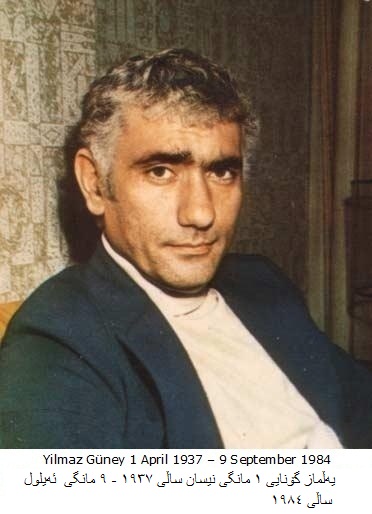
Yalmaz Guney

Yalmaz Guney was born in 1937 in the Yenice county of Adana. His father was a Zaza-Kurd from Siverek, and his mother was a Kurmanci-Kurd from Varto, north Kurdistan (Turkey). His parents migrated to Adana to work as cotton field laborers.
As a result of his family background young Yalmaz grew among the working class poor, which formed a strong background for his future works which generally focused on a realistic portrayal of down and out people in Turkey.
Guney studied law and economics at the universities in Ankara and Istanbul, but by the age of 21 he found himself actively involved in film-making. As Yeşilçam, the Turkish studio system, grew in strength, a handful of directors, including Atıf Yalmaz , began to use the cinema as a means of addressing the problems of the people.
Mostly, state-sanctioned melodramas, war films and play adaptations had previously played in Turkish theaters, but these new filmmakers began to fill the screens with more artistic, personal and relevant pictures of Turkish/Kurdish life. Yalmaz Guney was one of the most popular names to emerge from the Young Turkish Cinema, a gruff-looking young actor who earned the moniker "Çirkin Kral," ("the Ugly King") or (pasha nashrin) in Kurdish. After working as an apprentice screenwriter for and assistant to Atıf Yalmaz , Guney soon began appearing in as many as 20 films a year and became Turkey's one of the most popular actors.
Although the early 1960s brought problems for freedom to Turkey, Guney was imprisoned in 1961 for 18 months for publishing a "communist" novel. The country's political situation and Guney's relationship with the authorities only became tenser in the ensuing years. Not content with his star status atop the Turkey's film industry, Guney began directing his own pictures in 1965. By 1968 he had formed his own production company, Guney Filmcilik. Over the next few years, the titles of his films mirrored the feelings of the people of Turkey: Umut (Hope, 1970); Ağıt (Elegy, 1972); Acı (Pain, 1971); The Hopeless (1971).
After 1972, however, Guney would spend most of his life in prison. Arrested for harboring anarchist students, Guney was jailed during preproduction of Zavallılar (The Miserable, 1975), and before completing Endişe (Worry, 1974), which was finished in 1974 by Guney's assistant, Şerif Gören. This was a cherished role that Gören would repeat over the next dozen years, directing several scripts that Guney wrote laboriously while behind bars.
Released from prison in 1974 as part of a general amnesty, Guney was re-arrested that same year for shooting a judge Sefa Mutlu, the public prosecutor of Yumurtalık district in Adana Province, to death in a night club as a result of a drunken row[4] and given a prison sentence of 19 years. During this stretch of incarceration, his most successful screenplays were Sürü (The Herd, 1978) and Düşman (The Enemy, 1979), both directed by Zeki Ökten. Düşman won an Honourable Mention at the 30th Berlin International Film Festival in 1980.[5]
After escaping from prison in 1981 and fleeing to France, Guney won the Palme d'Or at the 1982 Cannes Film Festival for his film Yol, whose director in the field was once again Şerif Gören. It was not until 1983 that Guney resumed directing, telling a brutal tale of imprisoned children in his final film, Duvar (The Wall, 1983), made in France with the cooperation of the French government.
Varto (Kurdish: Gimgim) is a town in north kurdistan province Muş (eastern Turkey), occupied primarily by Kurdish people.
Varto was the site of a major fighting during the Sheikh Said rebellion in 1924, and the 1966 earthquake that killed nearly 3,000 people.
In the 1990s Varto was one of the hotbeds of Kurdish militancy led by the PKK. Although the city did not see ongoing battles, it was the hometown of many fighters and leading PKK commanders. The Turkish military garrison stationed in the city is surrounded by barbed wire and sandbags. The garrison patrols the city in armored personnel carriers (cars), though there has been no fighting in or around the city since the 1990s. Most Kirmancki Kurdish speakers are Alevis, whereas most Kurmanci Kurdish language speakers are Sunnis. The communities had a separate and quiet existence until 1980s. The last three decades have seen significant intermarriage, partially aided by the advance of Kurdish nationalism. Varto consists of the main city and 99 villages.
The population of Varto city is around 13,000 with another 17,000 living in the villages. In summer Varto and its villages are filled by expatriates that swell the total population well past the 75,000 mark.
The largest population from Varto in Europe is in Berlin (Germany).